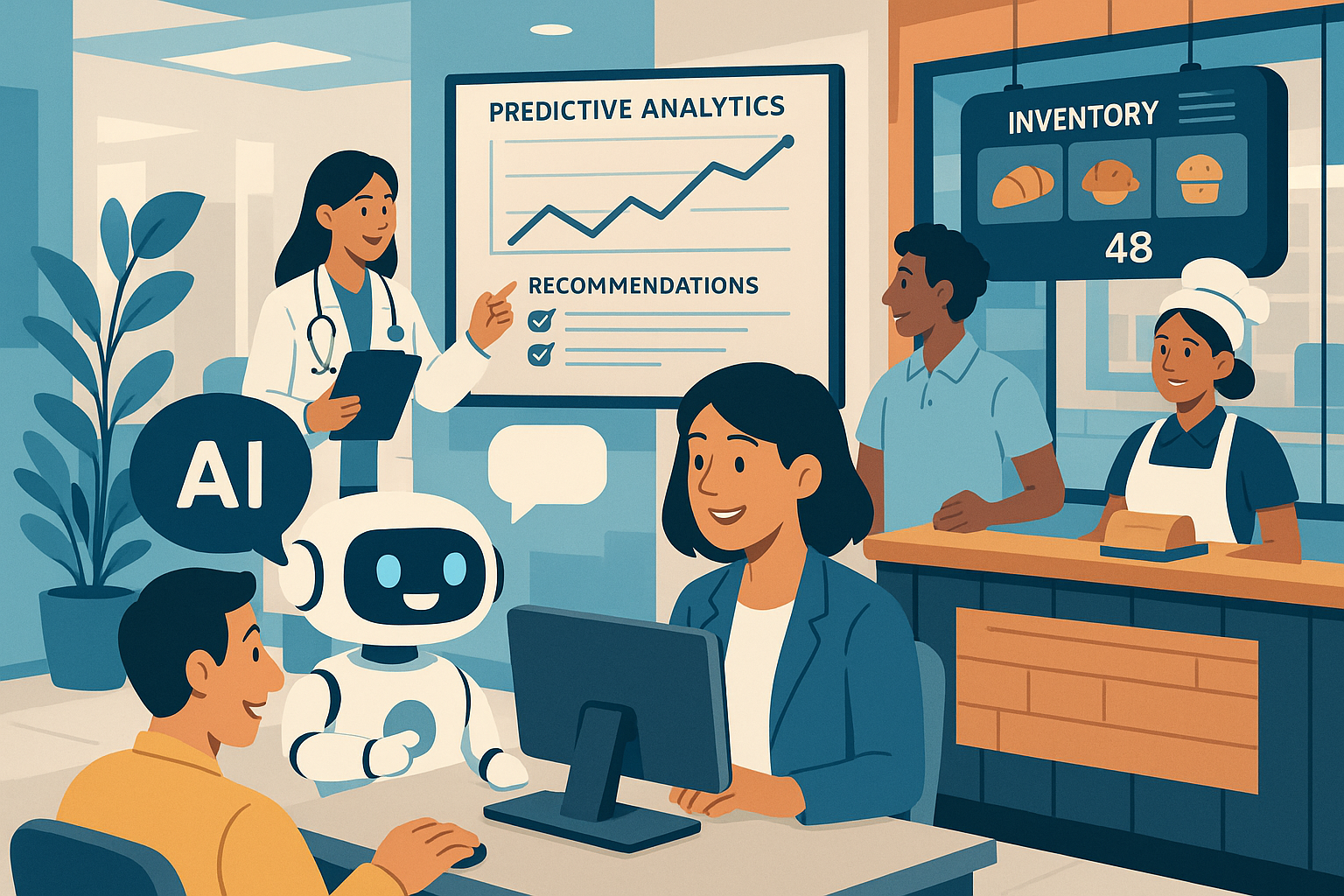Transforming SMBs: How AI-Driven Customer Insights Are Revolutionizing Business Strategies

Introduction
In the fast-paced world of business, small and medium-sized businesses (SMBs) are constantly on the lookout for innovative solutions to enhance customer engagement, drive conversions, and streamline operations. Enter AI-driven customer insights, a game-changer reshaping strategies across various industries. In this blog post, we’ll explore how AI-powered tools like chatbots and predictive analytics are not just trends, but vital components that are delivering measurable success for businesses in 2023.
Key Case Studies and Measurable Outcomes
Innovative companies are already reaping the benefits of AI. Let’s dive into some compelling case studies that demonstrate the tangible outcomes achievable through intelligent technologies.
DirectIQ: Streamlining User Support
DirectIQ, a SaaS and email marketing platform, integrated AI chatbots to enhance user support. By handling common queries autonomously and escalating complex issues when necessary, the platform not only automated support but also educated users through supplementary instructional content. This led to a noticeable reduction in support tickets, allowing the team to focus on more complex issues. Consequently, user engagement rose, resulting in an increase in monthly recurring revenue (MRR) as users became more proficient with the platform.
Effe Perfect Wellness: Personalized Health Recommendations
In the health and wellness sector, Effe Perfect Wellness utilized AI-powered predictive analytics to offer tailored wellness recommendations. By leveraging behavioral tracking data related to workouts, nutrition, and sleep, they crafted personalized content and targeted push notifications. This strategy proved effective, culminating in a staggering 40% year-over-year increase in orders and enhanced user retention.
Local Bakery: Smarter Inventory Management
A local bakery harnessed AI for demand forecasting, which significantly optimized their inventory management. By accurately predicting customer demand, they reduced waste significantly and aligned supply with demand. As a result, sales surged by 20% within just three months of implementation—a clear example of how AI can transform traditional business practices.
Auto Repair Shop: Proactive Maintenance Notifications
An auto repair shop took advantage of AI to enhance vehicle diagnostics, using predictive maintenance notifications that prompted customers to bring their vehicles in at the right time. This proactive approach increased bookings by 15% and significantly decreased the number of last-minute repair jobs, enhancing customer satisfaction and operational efficiency.
AI Technologies and Implementation Strategies
The remarkable outcomes from these case studies reflect a broader trend in AI technology adoption. Here are key areas where SMBs have effectively utilized AI to drive their success:
Chatbots and Virtual Assistants
Automating customer support with chatbots has proven beneficial in many sectors. For instance, businesses utilizing Microsoft Azure OpenAI Services reported quicker response times and improved customer retention rates. This allows human agents to focus on more complex queries, ensuring a high-quality customer experience.
Predictive Analytics
SMBs are increasingly deploying predictive analytics for tasks such as inventory optimization and demand forecasting. This approach has been particularly successful in retail and pharmacy sectors, where businesses have achieved notable operational cost reductions and improved customer satisfaction through more accurate stock management.
Personalized Recommendation Engines
By integrating machine learning algorithms, businesses analyze customer engagement data to deliver tailored recommendations. This personalization not only boosts conversion rates but also fosters deeper customer loyalty, creating a win-win for businesses looking to stand out in a competitive market.
Trends, Customer Expectations, and Competitive Advantage
The landscape of customer expectations is shifting rapidly. Here are some key trends that SMBs must recognize to maintain relevance:
- Demand for Hyper-Personalization: An impressive 75% of consumers now prefer personalized experiences from businesses, driving the need for tailored engagement strategies.
- Wider AI Adoption: AI tools are no longer the domain of large enterprises. Affordable, customizable solutions are increasingly accessible to SMBs, empowering them to compete more effectively.
- AI as a Force-Multiplier: Companies that leverage AI report enhanced operational agility and resilience, with faster, more accurate decision-making leading to significant advantages in the market.
Challenges Faced by SMBs
Implementing AI is not without its hurdles. Here are common challenges many SMBs encounter as they embark on their AI journey:
- Integration Complexity: Identifying and embedding suitable AI tools can be time-consuming, requiring considerable adjustments to existing processes and training.
- Data Quality and Compliance: The effectiveness of AI is heavily dependent on data quality. Many SMBs grapple with fragmented data and regulatory concerns that can hinder their AI effectiveness.
- Culture and Skills Gap: Transitioning to an AI-friendly environment often necessitates retraining staff and fostering a data-driven culture, which can be daunting for some organizations.
Common Themes and Best Practices
In the face of these challenges, here are best practices that can guide SMBs in implementing AI effectively:
- Identify Clear Use Cases: Begin with a specific challenge or opportunity, such as automating common customer inquiries or enhancing inventory management, where AI can deliver noticeable value.
- Start Small and Scale Gradually: Test AI solutions in a targeted area, evaluate performance against relevant KPIs, and iterate based on the results before scaling.
- Invest in Employee Training: Foster a culture of continuous learning and provide training to maximize AI adoption and return on investment.
Actionable Insights for SMBs
For SMBs looking to adopt AI-driven strategies, here are some actionable insights:
- Choose solutions that allow easy integration into existing operations, such as cloud-based AI tools for enhanced customer engagement and analytics.
- Regularly assess performance metrics and adapt strategies based on customer feedback and operational KPIs.
- Utilize vendor support; many tech providers now offer free workshops aimed at SMBs to help navigate the implementation process effectively.
Conclusion
The impact of AI-driven customer insights on SMB strategies is marked by significant improvements in engagement, sales, and operational efficiency. As companies continue to raise the bar for personalized customer experiences and affordable AI tools become more widely available, businesses willing to adapt with data-driven strategies are poised to achieve a sustainable competitive edge. Untap is here to help you navigate this transformative landscape—whether through smarter customer service, boosting conversions, or enhancing your website’s engagement with intelligent chatbots.